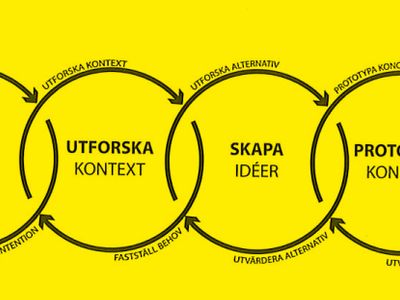This course presents to the student a generic, iterative project-based process that is used to manage the execution of new product development. The process builds on knowledge from previous project courses and extends the student’s basic knowldege in computer aided design and engineering software applications. What is unique in this specialization course is the development, design and engineering of a product concept that requires the communication and presentation of results from decisions in a variety of forms; verbally, illustratively, textually, physically (i.e. 3D printing and physical modeling) and virtually (i.e. in digital animations).
ML1213 Product Development and Design 15.0 credits
This course will be discontinued.
Decision to discontinue this course:
No information inserted
Information per course offering
Course offerings are missing for current or upcoming semesters.
Course syllabus as PDF
Please note: all information from the Course syllabus is available on this page in an accessible format.
Course syllabus ML1213 (Autumn 2025–)Headings with content from the Course syllabus ML1213 (Autumn 2025–) are denoted with an asterisk ( )
Content and learning outcomes
Course contents
Intended learning outcomes
- Describe the working methods and professional roles of industrial designers, design engineers and product developers in product development project
- Develop ideas by means of component and product prototypes in physical form, based on sketches using digital models
- Carry out common image processing operations, create animations and developing presentation material using text and image
- Discuss and use project plans, methods and support methods for project and product development, and account for and carry out the phases included in a product development project
- Together with other students carry out product development projects in a reflective, sustainable, quality considerate and responsible way
- Account for how ideas and products can be protected (patents, protection of designs, copyright and property rights)
Literature and preparations
Specific prerequisites
- Completed courses: ML1110, ML1200 and ML1209
- Approved module TEN2 in ML1101
Literature
You can find information about course literature either in the course memo for the course offering or in the course room in Canvas.
Examination and completion
Grading scale
A, B, C, D, E, FX, F
Examination
- PRO1 - Project work, 8.0 credits, grading scale: A, B, C, D, E, FX, F
- PDX1 - Examination, 1.0 credits, grading scale: A, B, C, D, E, FX, F
- TEN1 - Written examination, 2.0 credits, grading scale: A, B, C, D, E, FX, F
- ÖVN1 - Exercises, 1.0 credits, grading scale: P, F
- INL1 - Hand in exercise, 3.0 credits, grading scale: A, B, C, D, E, FX, F
Based on recommendation from KTH’s coordinator for disabilities, the examiner will decide how to adapt an examination for students with documented disability.
The examiner may apply another examination format when re-examining individual students.
If the course is discontinued, students may request to be examined during the following two academic years.
Examiner
Ethical approach
- All members of a group are responsible for the group's work.
- In any assessment, every student shall honestly disclose any help received and sources used.
- In an oral assessment, every student shall be able to present and answer questions about the entire assignment and solution.
Further information
Course room in Canvas
Registered students find further information about the implementation of the course in the course room in Canvas. A link to the course room can be found under the tab Studies in the Personal menu at the start of the course.
Offered by
Main field of study
Technology
Education cycle
First cycle